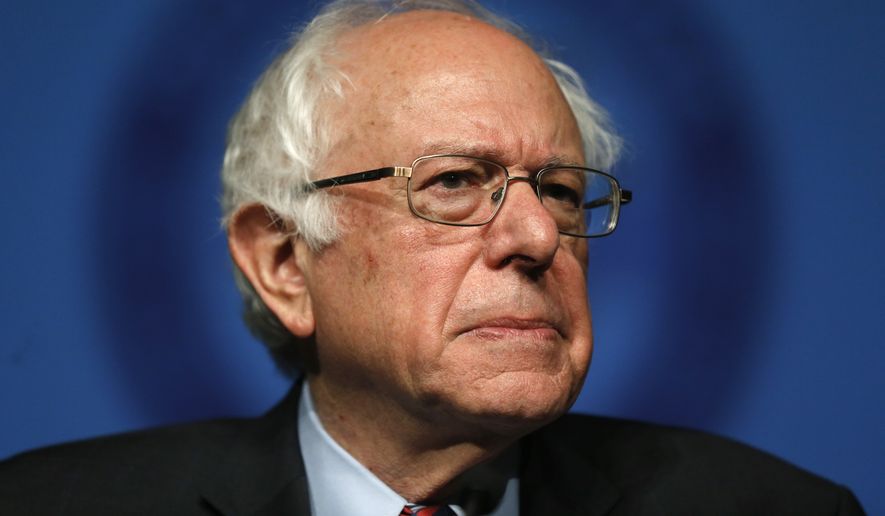The increasingly nasty public tone of the Democratic presidential race is also playing out behind the scenes, with superdelegates committed to Hillary Clinton facing a barrage of abusive and threatening emails urging them to switch allegiance and back her opponent, Sen. Bernard Sanders.
The guerrilla tactics include vows to try to oust Clinton supporters from office or threats to withhold funding from the Democratic Party.
But superdelegates reached by The Washington Times said they won’t be bullied.
“It goes with the territory. I have thick skin. But you’re not going to [get] people like myself to support your candidate by making threats,” said Ken Martin, chairman of the Minnesota Democratic-Farmer-Labor Party and a superdelegate backing Mrs. Clinton.
He said he receives between 10 and 20 threatening emails daily and gets just as many abusive phone calls, which he said were spurred by a Sanders supporter posting his cellphone number online.
Superdelegates are a unique part of Democrats’ nominating process. In addition to the delegates won at the ballot box, the party grants delegate status to 712 Democratic bigwigs, who are able to vote for whomever they want at the convention.
SEE ALSO: Verbal attacks between Hillary Clinton, Bernard Sanders turning nasty
Mrs. Clinton has locked up the support of 469 superdelegates so far, while Mr. Sanders has 31, according to the tally kept by The Associated Press.
Unless he’s able to get some of Mrs. Clinton’s backers to switch and support him, his path to the nomination is realistically very narrow.
Mr. Sanders has publicly urged Clinton supporters to defect, and his supporters have taken up the cry, particularly in states the senator won at the ballot box or in caucuses.
Pro-Clinton superdelegates targeted in Minnesota, where Mr. Sanders trounced Mrs. Clinton 61 percent to 38 percent in Democratic caucuses, included Gov. Mark Dayton and U.S. Sens. Al Frankin and Amy Klobuchar, as well as state party officials and national committeemen.
But even those in states won by Mrs. Clinton are feeling the heat.
Jocelyn Bucaro, chair of the Democratic Party executive committee in Butler Country, Ohio, and a superdelegate committed to Mrs. Clinton, said she gets cajoled with phone calls, emails and Facebook messages — though she didn’t describe them as threatening.
“Their arguments are mostly to follow the will of the voters of Ohio,” said Ms. Bucaro. She said it made her “giggle” because Mrs. Clinton won Ohio by a wide margin.
Still, she said that she respects “their passion for their candidate.”
“I think it is wonderful the they feel so strongly for their candidate. I hope, when this process is over, they will come out and support the nominee and support Democrats up and down the ticket,” said Ms. Bucaro.
A recent McClatchy-Marist Poll suggested that Mr. Sanders’ supporters won’t come together for the sake of the party if Mrs. Clinton, as expected, becomes the nominee.
The poll found that 25 percent of his supporters said they would not back Mrs. Clinton in a general election. What’s more, Mr. Sanders edged out Mrs. Clinton 49 percent to 47 percent in the national survey.
Those numbers underscore Mrs. Clinton’s vulnerabilities in the 2016 race, both as a primary candidate who can’t seem to muster the same enthusiasm as Mr. Sanders and as the likely nominee who will lose votes from the base when facing a Republican in November.
The Sanders campaign declined to comment on the actions of its supporters.
The liberal activist group Democracy for America (DFA), which is backing Mr. Sanders, has been promoting a petition that calls on superdelegates to back the popularly elected nominee.
DFA spokesman Neil Sroka said that threats have no place in politics but that it was “reasonable” for Minnesota voters to want the state’s superdelegates to respect the caucus results.
“It would make sense for superdelegates to reconsider who they are supporting,” he said. “Superdelegates should not decide who wins. The Democratic primary has to be decided by the grass-roots base of the Democratic Party — the people who vote and caucus.”
Mr. Martin compared the recent move by the Sanders campaign to realign superdelegates to a late-in-the-game “Hail Mary pass.”
He insisted that he wasn’t bucking the will of Democratic voters.
“The last thing any of us superdelegates want is to throw our party into tumult,” said Mr. Martin. “If Bernie ends up winning the majority of elected delegates, I will support him. However, in the meantime, I am supporting Hillary Clinton.”
Superdelegates from across the country complained that Mr. Sanders neglected to seek their support early in the race and has yet to reach out in person to them, instead making appeals from the stump and relying on supporters to do his bidding.
“Sanders knew what the rules were. He should have wooed us some time ago or talked to us some time ago,” said Jon M. Ausman, a Democratic Party committeeman from Florida and a superdelegate supporting Mrs. Clinton. “I haven’t heard from Bernie Sanders ever.”
They also expressed doubts about whether Mr. Sanders, an independent who is seeking the party’s presidential nomination, is committed to helping the party and its candidate up and down the ballot.
Ms. Bucaro said she hasn’t heard Mr. Sanders pledge his loyalty to the party and its candidates.
“He’s running to be the head of the Democratic Party,” she said. “He’s not a member of the Democratic Party now in the Senate, and I think it is important for whoever is the leader of the Democratic Party to work to elect Democrats. Whether he views it that way or not, I don’t know. I don’t know if he sees himself in that role.”
• S.A. Miller can be reached at smiller@washingtontimes.com.




Please read our comment policy before commenting.